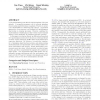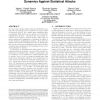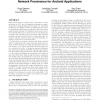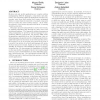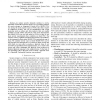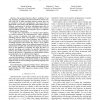CODASPY
2016
8 years 7 months ago
2016
Code randomization is an effective defense against code reuse attacks. It scrambles program code to prevent attackers from locating useful functions or gadgets. The key to secure...
CODASPY
2016
8 years 7 months ago
2016
In recent years, simple password-based authentication systems have increasingly proven ineffective for many classes of real-world devices. As a result, many researchers have conc...
CODASPY
2016
8 years 7 months ago
2016
In international military coalitions, situation awareness is achieved by gathering critical intel from different authorities. Authorities want to retain control over their data, a...
CODASPY
2016
8 years 7 months ago
2016
Many mobile services consist of two components: a server providing an API, and an application running on smartphones and communicating with the API. An unresolved problem in this ...
CODASPY
2016
8 years 7 months ago
2016
CODASPY
2016
8 years 7 months ago
2016
IEEEARES
2013
IEEE
9 years 6 months ago
2013
IEEE
The poster illustrates the idea of integrating digital social media with sensor networks (SoSeMe). In order to achieve tangible, specific results, we concentrate on the scenario o...
HOST
2013
IEEE
10 years 7 months ago
2013
IEEE
—As system security demands continue to evolve, Physically Unclonable Functions (PUFs) are a promising solution for secure storage on Integrated Circuits (ICs). SRAM PUFs are amo...
ESORICS
2013
Springer
10 years 7 months ago
2013
Springer
SPDZ (pronounced “Speedz”) is the nickname of the MPC protocol of Damg˚ard et al. from Crypto 2012. SPDZ provided various efficiency innovations on both the theoretical and p...
CSFW
2013
IEEE
10 years 7 months ago
2013
IEEE
Abstract—The security literature offers a multitude of calculi, languages, and systems for information-flow control, each with some set of labels encoding security policies that...
